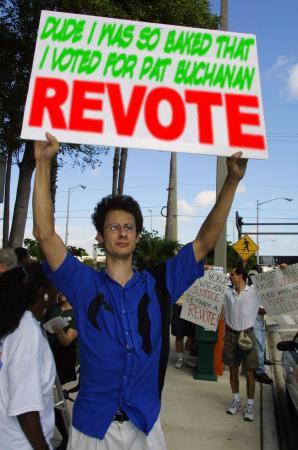Posted on April
30, 2015
Campaign Canards
Don’t fall for these electoral
fallacies
by
Daniel
Clark
Now that candidates are officially entering the 2016
race, it’s only a matter of time before political pundits and historians start regurgitating
every factoid, tidbit and dose of conventional wisdom there’s ever been about
presidential campaigns. Unfortunately,
most of them will be wrong. In
particular, here are some of the most stubborn electoral fallacies that we can
expect to hear repeated over the next 18 months:
*
The New Hampshire primary results are very important.
– From a fundraising standpoint, there may be some truth to that, but the idea
that the First-in-the-Nation primary serves as a predictor of the nationwide
outcome hasn’t panned out over the years.
True, a majority of the votes have been won by the eventual nominees,
but many of those have been in races involving an incumbent president, or an
otherwise prohibitive favorite. When
nominations have been more hotly contested, the NH primary has been won by such
losers as Democrats Edmund Muskie, Gary Hart, Paul Tsongas and Hillary Clinton,
and Republicans Henry Cabot Lodge Jr. and Pat Buchanan. John McCain actually carried the state by a
greater margin in 2000, when he lost the nomination, than when he won it in
2008.
 * A Republican candidate must run to
the right in the primaries, and to the center during the general election
campaign. – In other words, he should misrepresent himself at
least half of the time. This tactic is
often attributed to Richard Nixon, who, to the contrary, won the presidency by
attacking the 60s counterculture and accusing Hubert Humphrey of being soft on
Communism. Our next two-term president,
Ronald Reagan, was noted for his ideological consistency, and did not tailor
his message to fit the political calendar.
The best example of a candidate who did follow this advice was John
McCain, who during the ’08 primaries pandered to conservatives on border security
with his laughable “complete the danged fence” ad. During the general election campaign, “I will
work with Democrats” became his unofficial slogan. How’d that work out?
* A Republican candidate must run to
the right in the primaries, and to the center during the general election
campaign. – In other words, he should misrepresent himself at
least half of the time. This tactic is
often attributed to Richard Nixon, who, to the contrary, won the presidency by
attacking the 60s counterculture and accusing Hubert Humphrey of being soft on
Communism. Our next two-term president,
Ronald Reagan, was noted for his ideological consistency, and did not tailor
his message to fit the political calendar.
The best example of a candidate who did follow this advice was John
McCain, who during the ’08 primaries pandered to conservatives on border security
with his laughable “complete the danged fence” ad. During the general election campaign, “I will
work with Democrats” became his unofficial slogan. How’d that work out?
*
Presidential debate performances are critical – With few
exceptions, the media will routinely claim that the Democrat won, and will cook
up dubious polling results to prove it.
Can you remember any Democrat who was actually a great debater,
though? If you’re old enough, you
probably answered Walter Mondale. The
former VP clearly won the first of his two debates with President Reagan, and
he also performed very well in the debate that Reagan won. Had it been a World Cup qualifying aggregate
goals series, Mondale would have been declared the winner, but what good did it
do him? He probably would have carried
Minnesota anyway. On the other hand, Al
Gore was the worst debater of all time.
In the ’92 vice presidential debate, Dan Quayle hammered away at Bill
Clinton all night long, and Gore never once piped up in his defense. In 2000, Gore set all-time presidential debating
records for retractions, audible sighs, comical makeup jobs, mental instability
and general creepiness. Yet he would
have become president if only the Democrat toadies on the Floridian canvassing
boards had continued their Carnac the Magnificent routine for 538 more
ballots. G.W. Bush was a terrible
debater himself, and so was Barack Obama, and each went on to become a two-term
president.
 * Howard Dean lost in 2004 because of
his scream after the Iowa caucuses. – Or, as a typical
left-wing fruit bat would put it, the former Vermont governor lost because of
his fictitious scream, which was fabricated by dastardly conservative radio
hosts who feared his nomination. In
truth, there’s no doubt about the authenticity of his public unraveling, where
the scream merely punctuated a harangue in which he randomly shouted the names
of states he intended to carry. His
deranged facial expression and wild gesticulations were reminiscent of Curly,
in that Three Stooges episode where they sang “Swingin’
the Alphabet” (b-a-bay!, b-e-bee!). Moreover, this display was the result of his
failed campaign, and not the cause of it.
The reason Dean gave the speech was to keep his supporters’ spirits up
after a devastating loss in Iowa. The
media hype over his high-tech, youth-centered campaign had made him the
favorite to win the nomination. In
particular, he was thought to have an organizational advantage that would prove
effective in a caucus format. His
third-place finish in the Hawkeye State showed that to be illusory. The subsequent scream was not a turning
point, but only an off-key swan song for a campaign that never was.
* Howard Dean lost in 2004 because of
his scream after the Iowa caucuses. – Or, as a typical
left-wing fruit bat would put it, the former Vermont governor lost because of
his fictitious scream, which was fabricated by dastardly conservative radio
hosts who feared his nomination. In
truth, there’s no doubt about the authenticity of his public unraveling, where
the scream merely punctuated a harangue in which he randomly shouted the names
of states he intended to carry. His
deranged facial expression and wild gesticulations were reminiscent of Curly,
in that Three Stooges episode where they sang “Swingin’
the Alphabet” (b-a-bay!, b-e-bee!). Moreover, this display was the result of his
failed campaign, and not the cause of it.
The reason Dean gave the speech was to keep his supporters’ spirits up
after a devastating loss in Iowa. The
media hype over his high-tech, youth-centered campaign had made him the
favorite to win the nomination. In
particular, he was thought to have an organizational advantage that would prove
effective in a caucus format. His
third-place finish in the Hawkeye State showed that to be illusory. The subsequent scream was not a turning
point, but only an off-key swan song for a campaign that never was.
*
The primary system lends itself to the nomination of extremists
– This canard is based on the belief that a candidate can only win his party’s
nomination by appealing to its base. In
reality, the frontloading of open primary states on the electoral schedule
gives a distinct advantage to so-called “moderate” candidates. This perverse arrangement allows members of
one party to cross over and vote in the other party’s primary. Thus, a Florida Democrat can have a say in
who wins the GOP nomination, whereas a Pennsylvania Republican won’t get to
cast a ballot until the race is effectively over. This system only produces “extreme” nominees
in that they are extremely mushy.
*
A presidential nominee can be expected to pick one of his primary opponents as
his running mate. – Media speculation about the selection
of a VP candidate usually swirls around the field of primary candidates, when
more often, the nominee will go off the board and pick someone who wasn’t
running. If you look at the occasions in
recent decades where primary opponents have paired up, it’s easy to see why it
doesn’t happen more often. Remember Bush
accusing Reagan of practicing “voodoo economics,” or Biden saying that Obama
wasn’t ready to be president. Such
unnecessary conflicts are easily avoided by picking a running mate from outside
the primary race, like Quayle, Gore, Lieberman, Cheney, Palin or Ryan.
*
Nixon employed a racist “Southern Strategy” to win in 1968, thereby magically
transferring the Democrat Party’s long history of racial oppression to the GOP.
– When confronted with their own party’s past, liberals often respond with the
phrase “Southern Strategy” as if they were declaring checkmate, but have you
ever heard them explain what they mean by it?
There was no initiative that Nixon called his Southern Strategy, nor did
he fare all that well in the South. The
racist was Democrat governor George Wallace of Alabama, who waged a
segregationist third-party campaign against Nixon and Democrat nominee
Humphrey. While Wallace and Humphrey
divided the Democrat vote, Nixon carried the Republican strongholds in the West
and Midwest, winning the election largely on the strength of California,
Illinois and Ohio. The conventional
wisdom, as told by liberal media and academia, is a total fabrication, as
usual.
 * Pat Buchanan’s 1992 convention
speech caused George H.W. Bush to lose his reelection bid.
– It’s unlikely enough that a sitting president was rejected because of
controversial remarks from his chief detractor, but Buchanan absolutely did not
“call for” a religious war in America, as he would later be accused of doing. He simply acknowledged one that was already
going on. “It is a cultural war,” he
added, “as critical to the kind of a nation we will one day be as was the Cold
War itself.” That’s so plainly true as
to be uncontroversial, which may be why his speech was well received, contrary
to revisionist fantasy. If any speech at
that convention was a disaster, it was First Lady Barbara Bush’s “family
values” speech, in which she undermined the whole event by nonjudgmentally
blathering, “However you define family, that’s what we mean by family
values.” Of course, the only person
really at fault for President Bush’s defeat was himself, for his willingness to
“compromise” with the Democrats on the largest tax hike to that point in American
history.
* Pat Buchanan’s 1992 convention
speech caused George H.W. Bush to lose his reelection bid.
– It’s unlikely enough that a sitting president was rejected because of
controversial remarks from his chief detractor, but Buchanan absolutely did not
“call for” a religious war in America, as he would later be accused of doing. He simply acknowledged one that was already
going on. “It is a cultural war,” he
added, “as critical to the kind of a nation we will one day be as was the Cold
War itself.” That’s so plainly true as
to be uncontroversial, which may be why his speech was well received, contrary
to revisionist fantasy. If any speech at
that convention was a disaster, it was First Lady Barbara Bush’s “family
values” speech, in which she undermined the whole event by nonjudgmentally
blathering, “However you define family, that’s what we mean by family
values.” Of course, the only person
really at fault for President Bush’s defeat was himself, for his willingness to
“compromise” with the Democrats on the largest tax hike to that point in American
history.
*
“America wasn’t ready” for a female vice president in 1984
– Anybody could see that Walter Mondale was not going to unseat incumbent
president Reagan. How convenient, then,
that he would pick obscure House member Geraldine Ferraro as his running mate. If America “wasn’t ready” for a female VP,
then Mondale’s inevitable crushing defeat would demonstrate that he and his
party were superior to America, wouldn’t it?
It naturally follows that he might have won, if only he’d stooped to the
same level as those morally inferior American voters. In reality, the voters of 49 states rejected
him, not her. The man represented a
return to the Carter years, after all.
If there was anything for which America wasn’t ready, that was it.
*
We needed Carter in order to get Reagan – If nobody ever
remembers anything else about the 70s, we should remember that there was
absolutely no need for America to experience the tragedy that was President
James Earl Carter. The common
rationalization is that the Reagan presidency only happened as a reaction to
Carter, and therefore that victory in the Cold War and the economic boom of the
80s were the indirect results of four years of malaise and defeatism. The fact of the matter is that we could have
had Reagan in 1976, when he almost beat incumbent president Gerald Ford for the
Republican nomination. Carter only
defeated Ford 50 percent to 48, in spite of Ford’s having to carry Nixon’s
baggage, the controversy of his having pardoned Nixon, and his shocking obliviousness
to Soviet domination of Eastern Europe.
Reagan would almost certainly have defeated Carter in ’76, just as he
did in ’80. For the last time, we did
not need Jimmy Carter. He is the single
most unnecessary person in American political history.
*
In 2008, Barack Obama promised to “fundamentally transform” America, announced
his intention to “spread the wealth,” deployed “truth squads” of sympathetic
prosecutors and law enforcement officials to threaten his critics with
unspecified punishments, apologized for America and declared himself a “citizen
of the world” during a speech in Germany, and publicly joked about himself
being a Communist, yet was still elected president.
– Actually, this one is true. Sorry.
The Shinbone: The
Frontier of the Free Press